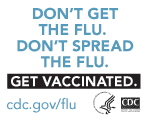CDC In the News
CDC Responds to Questions About Vaccines
Published: March 28, 2008

A recent opinion column "Give Us Answers on Vaccines" by David Kirby in the Atlanta Journal-Constitution, which misinterpreted available information about a case before the National Vaccine Injury Compensation program, may have parents wondering what is best for their child when it comes to immunizations. That is unfortunate, given that our nation's childhood vaccines are very safe and are proven to protect and save lives.
Parents should know that CDC, along with other agencies in the U.S. Department of Health and Human Services and the wide range of scientists and health professionals involved in the nation's immunization programs take seriously questions and concerns related to vaccine safety. Furthermore, our efforts in vaccines, developmental disabilities and the health of children go far beyond our professional interests- as many of the dedicated professionals involved are also parents and grandparents.
Mr. Kirby's column included many inaccuracies related to childhood vaccines. As such, it illustrates that when it comes to immunizations, child development and specific medical conditions the best source of guidance is the child's health care provider. Parents should not be reluctant to ask their child's doctors or nurses about any health concerns, including immunizations. Vaccines are often given early in life in order to protect against diseases that can seriously harm infants and young children. The joint immunization recommendations of CDC, American Academy of Pediatrics and American Academy of Family Physicians do recognize there are instances when a child should not receive a recommended vaccine or when a recommended vaccination should be delayed. Those decisions, however, are best made in consultation with the child's doctor.
As the column correctly noted, vaccine injury cases are often handled through the National Vaccine Injury Compensation program administered by HHS' Health Resources and Services Administration (HRSA). This program is charged with determining whether a claimed injury meets pre-established criteria or if vaccination may have contributed to a child's serious medical or health condition. If such a determination is made, the program works to provide timely and compassionate compensation.
Since 1988, HRSA's vaccine injury program has provided compensation in about 2,100 cases, including some that have involved vaccines and encephalopathy (injury to the brain). While Mr. Kirby's column suggested otherwise, to date, this program has never determined in any case that autism was caused by a vaccine. In comparison, during this same time period about 100 million American children received recommended childhood vaccinations, and cases of vaccine preventable diseases in the U.S. have decreased to record or near record lows.
Recently, mitochondrial disorders have become the focus of media attention with respect to vaccine injury compensation. Mitochondrial disorders, which occur very rarely in children, are believed to be genetic. Children born with these disorders often appear normal through the first years of life. When placed under severe stress from such things as infections, fever, dehydration, malnutrition or lack of sleep, children with these disorders often experience loss of some brain and nervous system functions.
Some have suggested that infants and children be screened for mitochondrial disorders before getting recommended vaccinations. Unfortunately, mitochondrial diseases are very difficult to diagnose and it is usually not possible to identify children with such disorders until there are signs of developmental decline. A definitive diagnosis often requires multiple blood tests and may also require a muscle or brain biopsy (removal of a portion for testing, usually under anesthesia). Therefore, providing routine screening tests on children who have no symptoms would bring other medical risks and raise many ethical questions.
At present, we do not know definitively if vaccines can trigger neurological or developmental declines among children with mitochondrial disorders. We do know, however, that infections can cause neurological and developmental declines among these children—and we also know that childhood vaccinations protect children against some of the same infections known to cause developmental decline among children with mitochondrial disorders. These include vaccine-preventable diseases like measles, chickenpox and influenza.
In the case of children with mitochondrial disorders, we do not yet have sufficient evidence to make general immunization recommendations. Physicians who care for children with these disorders usually recommend that these children receive their childhood vaccines, but depending on the child's health status or medical condition, they may change when those vaccinations are provided.
We recognize that developmental disorders whether related to mitochondrial disease, autism or other causes are a serious challenge for many families. In the case of autism, CDC has actively supported vaccine safety research in this area. To date, the best science indicates that there is no association between vaccines and autism. As part of our efforts to foster understanding of autism, CDC is currently conducting the largest study to date designed to identify potential autism causes and risk factors.
We recognize that much of the success of our nation's immunization efforts comes from the trust of parents. We do not take that trust lightly. Rather, CDC, FDA and other HHS agencies are continually working to expand efforts in vaccine safety research and science as well as clinician and parent input and involvement. Like parents, we want the best information possible when it comes to protecting and ensuring children's health.
Our nation's high immunization rates are the reason why very few children suffer from vaccine preventable diseases that, in the past, used to harm them in large numbers. These high rates show that parents realize the importance of childhood vaccinations. CDC is committed to maintaining that high level of support as well as making sure all our efforts are working to foster the health of children.
Anne Schuchat, M.D.
Director, National Center for Immunization and Respiratory Diseases, Centers for Disease Control and Prevention and
Assistant Surgeon General, U.S. Public Health Service
For More Information
Page last updated: March 28, 2008
Content source: Centers for Disease Control and Prevention
Content owner: National Center for Health Marketing
URL for this page: www.cdc.gov/news/2008/03/VaccineQuestions.html

